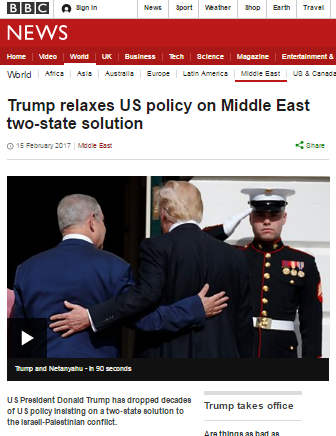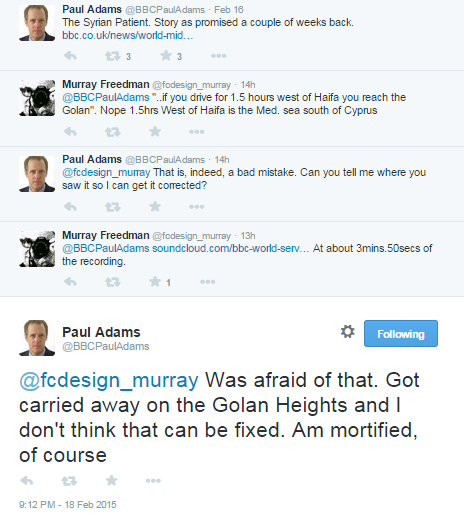On February 15th visitors to the BBC News website came across two articles telling them that the new US administration had changed that country’s policy on the Palestinian-Israeli conflict.
Israel-Palestinian conflict: Two-state solution not only option, US says:
“A White House official says a two-state solution may not be the only option to solve the Israel-Palestinian conflict, signalling a major policy shift. […]
For decades successive US governments have backed a two-state solution – the idea of establishing an independent Palestinian state that lives side-by-side with Israel.
But on Tuesday, an unnamed senior White House official suggested the US would support any form of final peace deal reached between Israel and the Palestinians, retreating from its long-term insistence of a two-state formula.” [emphasis added]
Trump relaxes US policy on Middle East two-state solution:
“US President Donald Trump has dropped decades of US policy insisting on a two-state solution to the Israeli-Palestinian conflict. [emphasis added]
The BBC was of course not the only media outlet to promote that theme but, as Yair Rosenberg explained at the Tablet, it is not fact-based.
“Yesterday, President Donald Trump made a fairly straightforward statement about the two-state solution to the Israeli-Palestinian conflict that was promptly inflated into a geopolitical earthquake by much of the media. “I’m looking at two-state and one-state, and I like the one that both parties like,” he said. “I’m very happy with the one that both parties like. I can live with either one. I thought for a while the two-state looked like it may be the easier of the two. But honestly, if Bibi and if the Palestinians-if Israel and the Palestinians are happy, I’m happy with the one they like the best.”
As I noted at the time, this formulation did little to alter American support for the two-state solution in practice, since both sides of the Israeli-Palestinian conflict do not “like” the one-state solution:
[D]ecades of polling shows that while Israelis and Palestinians narrowly support a two-state outcome, they are decidedly opposed to a one-state endgame, which many see as a recipe for strife and civil war. Most recently, a joint 2016 survey by Khalil Shikaki, director of the Palestinian Center for Policy and Survey Research, and the Israel Democracy Institute, found that 68% of Palestinians oppose the one-state solution, as do 64% of Israelis.
Thus, given Trump’s own qualifications, his words functionally did nothing to change traditional U.S. support for the two-state solution as the preferred solution of both parties. As Ilan Goldenberg, a former Israeli-Palestinian peace negotiator under John Kerry, put it, “One state is being overhyped in this instance as long as Trump keeps talking about what works for both parties.” But you wouldn’t know this from reading some of the breathless reports that followed Trump’s initial statement on Wednesday.”
Rosenberg also analysed why the media – including the BBC – got this story wrong.
“The press, however, has been primed for a major Trump shift on Israel policy since day one, and has been interpreting events through that distorting lens. Searching for a dramatic sea change that simply has not arrived, reporters latched onto Trump’s largely anodyne comments about two states as confirmation, only to have their preconceived notion quickly dashed on the rocks of reality.
Of course, Trump may well decide to withdraw U.S. support for the two-state solution at some point in the future. But there is no evidence that he has done so. The histrionic hubbub surrounding his recent comments, then, should serve as a cautionary tale for media outlets about the power of narrative assumptions to overtake the actual facts.”




